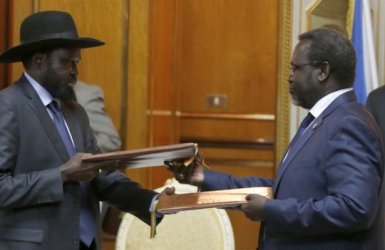S. Sudan government says it won’t initiate agenda for talks with rebels
May 15, 2014 (JUBA) – South Sudan’s government said on Thursday that it will not initiate an agenda for talks with the rebels, saying its delegation would only respond to issues raised by the aggrieved party.

Gbandi reaffirmed the government’s commitment to ending the conflict and that president Salva Kiir had given the delegation full authority to negotiate in good faith.
Rebel sources in the Ethiopian capital, Addis Ababa, also confirmed that the government has said it will not initiate the agenda for talks.
“It is true they (the government delegation) said it is the aggrieved party … but they are refusing everything, we don’t how to proceed with this arrogance,” a leading member of the rebel delegation at the talks told Sudan Tribune on Thursday.
Observers have expressed scepticism about the sincerity of the two rival leaders to end the five-month-old conflict, although both made pledges at the signing ceremony last week to restore peace to the country.
“It is not clear whether the president is getting [the] right information from the negotiation team and from the army. There appears to be a gap from what is happening on the ground either in Addis Ababa or in the field with the commanding officers,” an independent observer, who spoke on condition of anonymity, told Sudan Tribune on Thursday.
He claims the president’s close allies were not giving him an accurate picture of the situation as some of the officials felt they might be adversely affected by the changes which would result from interim arrangements.
“The closest allies, those who appeals decision of the president do not tell him the truth. If they give the impression that the situation appeals bold decision, they risk being branded incompetent, so they give a less bad picture to their boss so that they can continue to remain in the offices to enjoy the privileges of occupying public offices,” he said.
“When the crisis erupts last December, no-one was able to deal with it effectively because the whole team was confused and did not want to say it was not a coup,” he added.
The armed opposition movement, led by former vice-president Riek Machar and consisting largely of ethnic militia and disaffected officials and soldiers, launched a rebellion against the central government following escalating political tensions within the ruling SPLM.
(ST)
